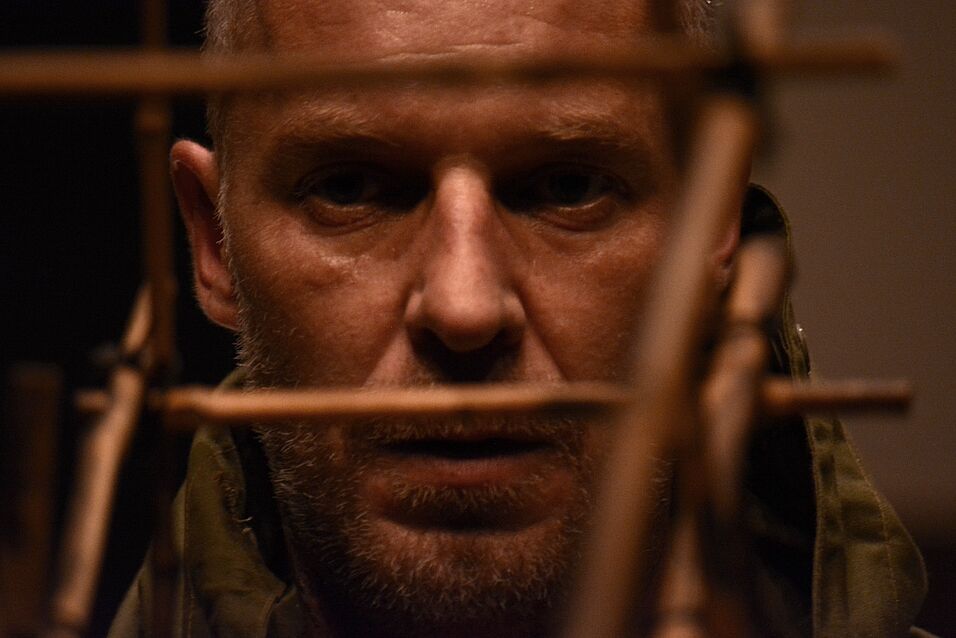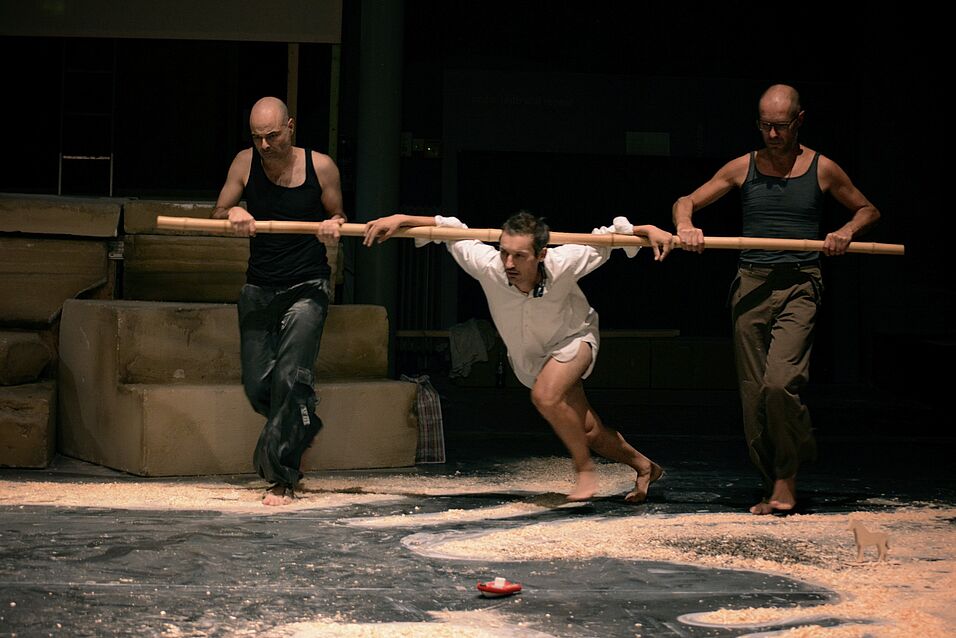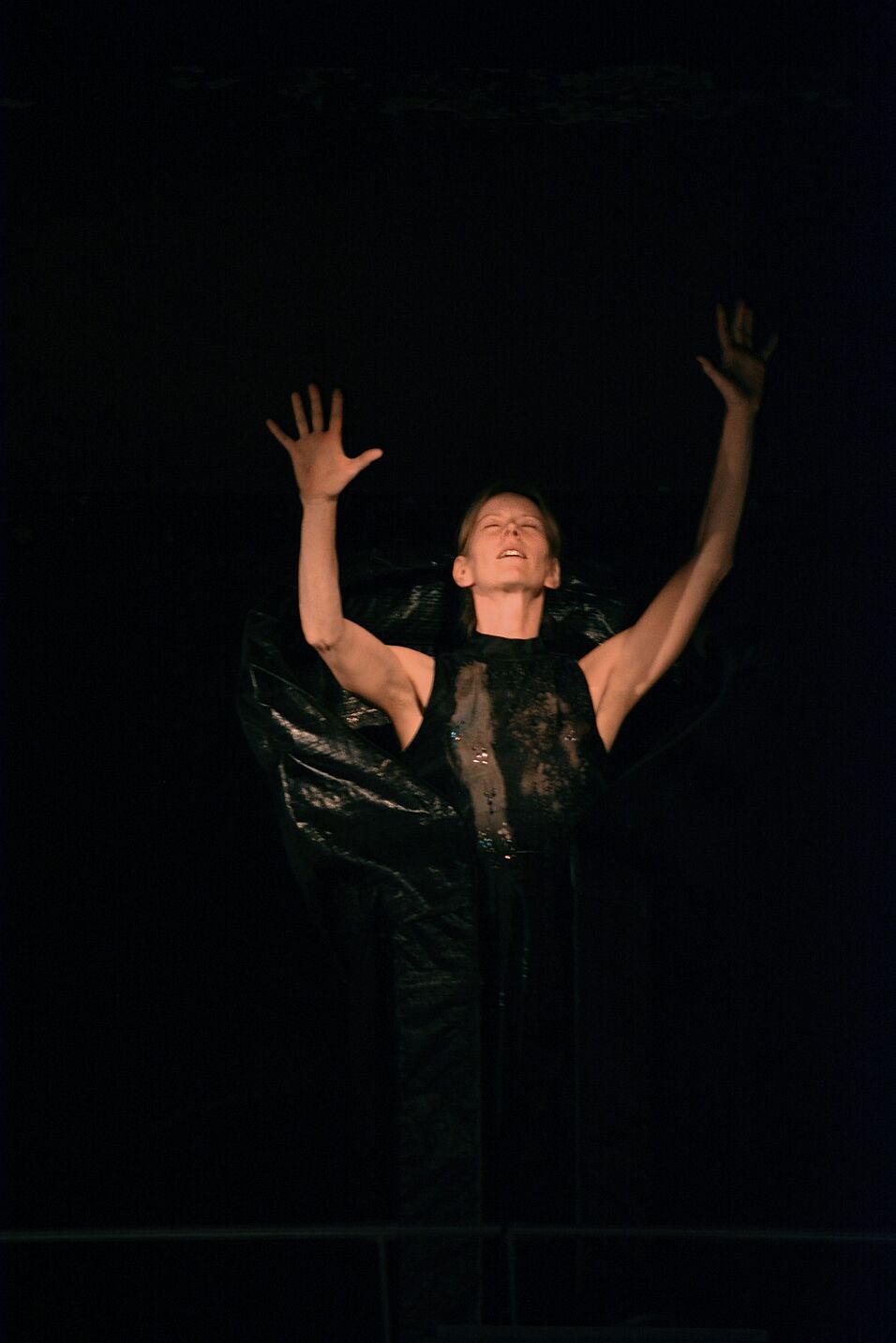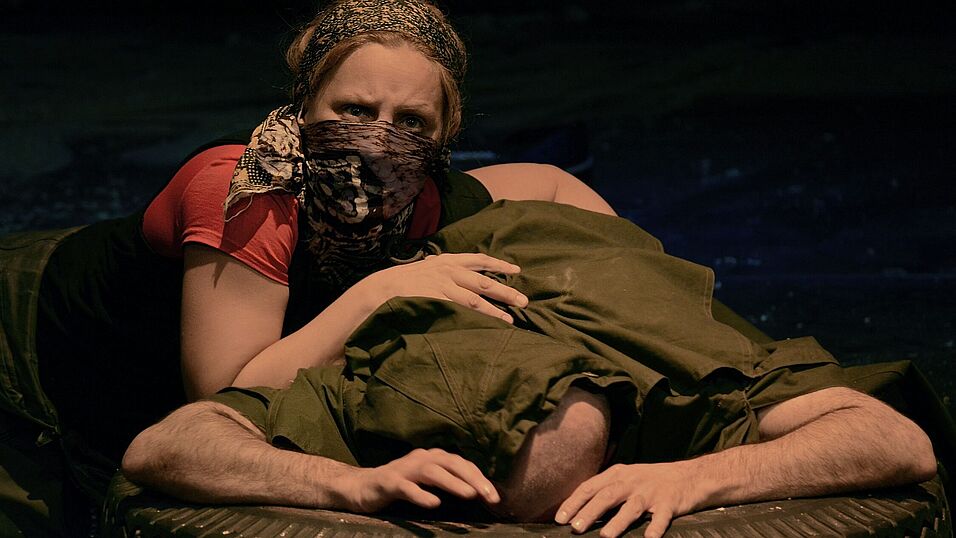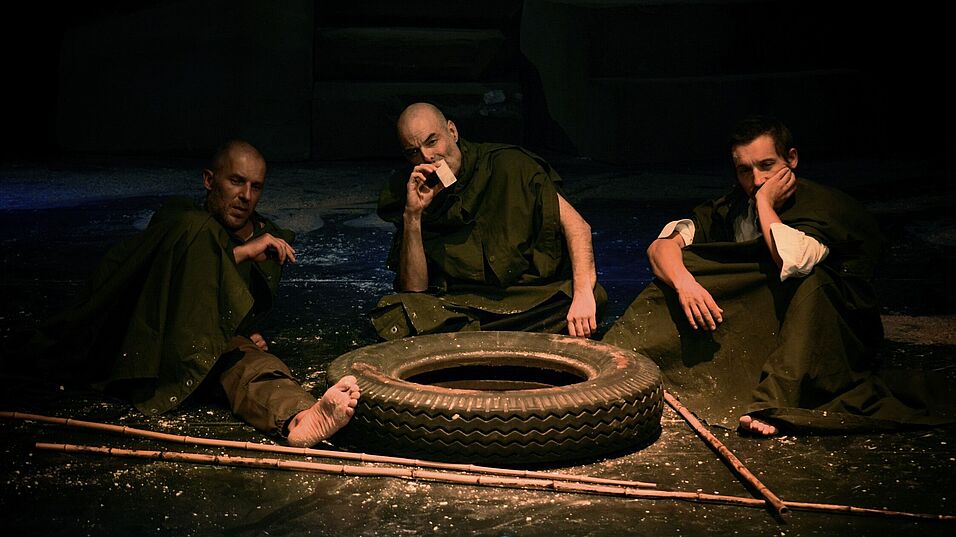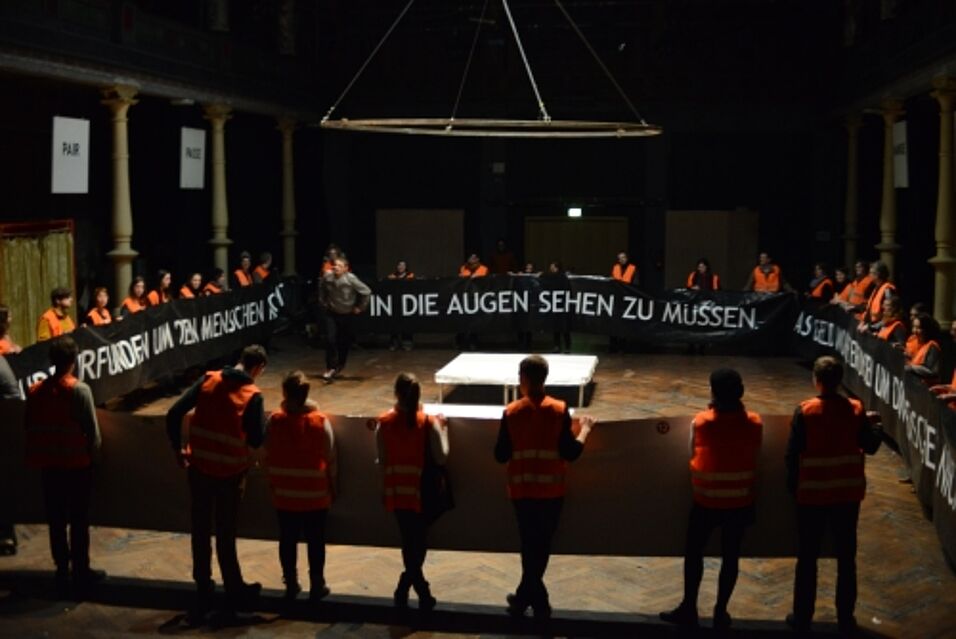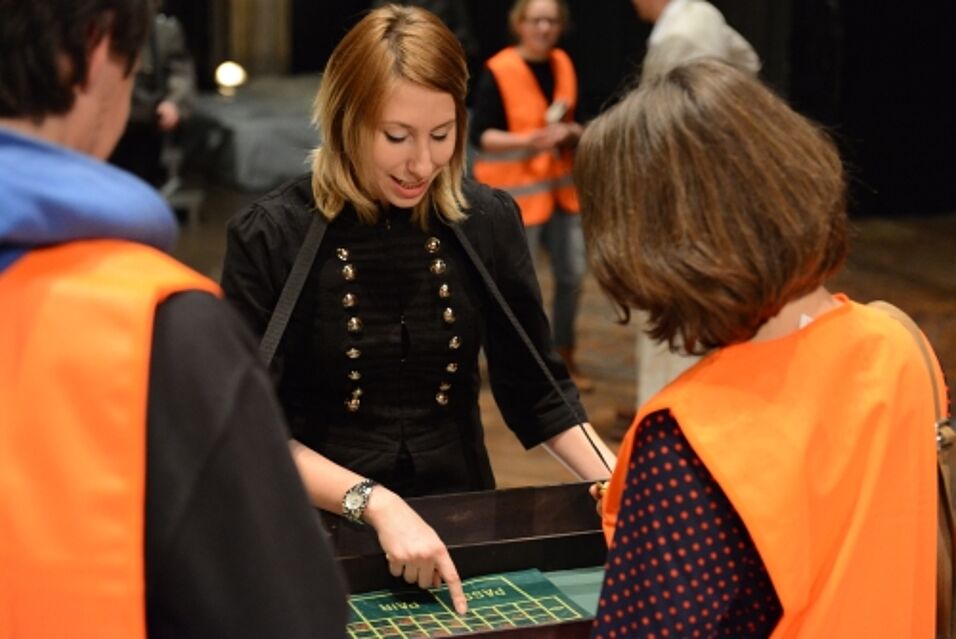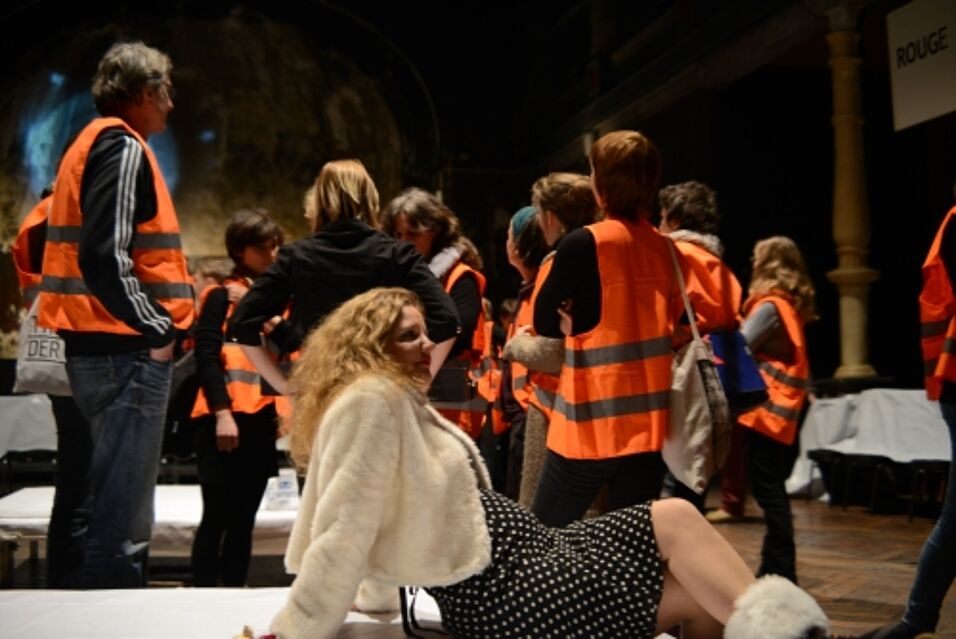In 2011, the Schau-Ensemble was founded as a collective of professional theater producers in Leipzig in order to develop and realize theater projects, using the Schaubühne Lindenfels as a workplace and base camp. The theater the collective works from is a highly unique space. It is a historic entertainment venue located in a former industrial suburb which has been renovated and expanded multiple times. It has had different roles at different times: dance palace, concert hall, vaudeville stage, and movie theater. For the last 20 years, it has been an interdisciplinary event and production house for contemporary art.
The essential characteristic of this theater concept plays on the idea that performances go beyond the stage and the typical scene space. In the performances, spectators become participants, and the settings evolve from the source material. The settings and scenes therefore arise from the encounter between actors and audience, in a specially designed formation of functionality – a scenic display. In this sense, the “scene” describes the concrete constellation and interaction, which however does not necessarily need the audience to actually “join in” in order to unfold itself. The perception of space and story, which is only created by the presence of the audience, leads to an active integration. The audience's presence is defined as a vital necessity for the play.
The theater productions of the Schau-Ensemble range from small to large-scale productions, from theatrical walking tours to seated performances. The audience moves between moments of action and passivity, aerial views and one-on-one situations, direct and indirect live play (via acoustic or visual media), between narration and drama, moderated and open dialogue.
“Agenor’s daughter marvelled at how beautiful he was and how unthreatening. ... The royal virgin even dares to sit on the bull’s back ... her clothes fluttering, winding, behind her in the breeze.” (Ovid, Metamorphoses)
You do not have to have read Ovid to come across the same bull that Zeus morphed into. In whose form he kidnapped the Phoenician princess Europa, took her to Crete, raped her, and she as a result bore the famous King Minos. Today, we face that bull in Strasbourg in front of the European Parliament, we find him in our wallets on the 2 Euro coin, we see him on a trip to the art history museum. In this unreflecting manner, the story of our continent's namesake turns into a popular photo motif, a cheerful tale from the cradle of occidental culture. For 4000 years the antique myths have been passed down, consumed, and updated to the present as erotic tales, exalted chants, and high-cultured grand theater, fitting for both salons and bedrooms. Only once in blue moon does the curtain tentatively raise and allow for a critical view of our cultural history. And yet our myths, which cannot be clearly separated from real history, show striking parallels to subsequent acts of land grabbing and colonialism.
Inspired by the “Book of princesses” by cultural critic Klaus Theweleit, we take on a discursive point of view. Reduced to divine will of a Zeus, Poseidon, or Apollo, the taking of Helen can nevertheless be interpreted as a cover-up of colonial land grabbing and the extinction of foreign cultures, which is carried out using the bodies of women, who occupy an ambivalent role between victim, helper, and traitor – at least in the tales of the victors. We give both the antique princesses as well as their real, American counterparts the chance to speak. Medea, Cassandra, Dido, Ariadne, Pocahontas and Malinche transport us to the present, and suggest that the doctrine of male-dominated history – in the form of war and violence – rarely leads to a happy ending.
Director: René Reinhardt
Stage, costumes: Elisabeth Schiller-Witzmann
Actors: Johannes Gabriel, David Jeker, Laila Nielsen, Mario Rothe-Frese, Anka Liebe (guest), Verena Noll (guest)
Dramatization: Friederike Köpf
Guest student of the director: Katherin Bryla
Video, sound: Gábor Hollós
Technical director: Jan Ehrlich




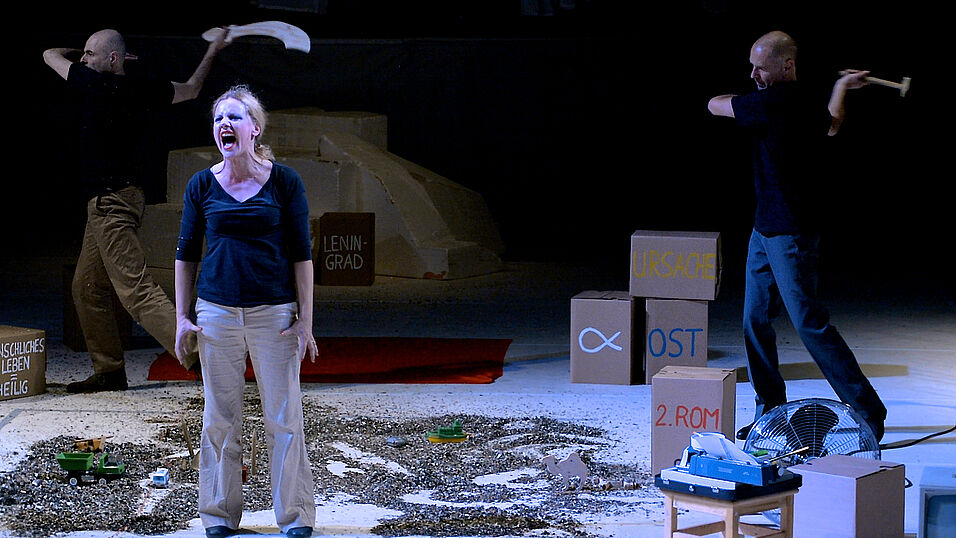

Johannes Gabriel, David Jeker, Laila Nielsen, Mario Rothe-Frese, René Reinhardt, Elisabeth Schiller-Witzmann, Ilona Schaal, Gábor HollósJoseph Brodsky: famous and forgotten at the same time. A Nobel laureate of literature that his own country, Russia, could not tolerate. After his deportation in 1972 until his untimely death in New York in 1996, Brodsky would never visit the country again. He would have turned 75 in 2015, and 2016 marks the 20th anniversary of his death.
Joseph Brodsky: famous and forgotten at the same time. A Nobel laureate of literature that his own country, Russia, could not tolerate. After his deportation in 1972 until his untimely death in New York in 1996, Brodsky would never visit the country again. He would have turned 75 in 2015, and 2016 marks the 20th anniversary of his death.
In the production BRODSKY, the SCHAU-Ensemble draws closer to this poet and observer of the world, who even in exile never lost his voice. For him, language became an actual place of retreat, it enabled him to bear life itself without having to construct a form of social utopia. Brodsky was an “enthusiastic companion to the light source of world poetry”, as the Swiss novelist and Brodsky- translator Ralph Dutli puts it.
Through a montage of lyrical, essayistic and dramatic texts, and through the performances of the characters that emerge from them, the linguistic and intellectual cosmos of the poet comes to life. The play mirrors the multifacetedness of Brodsky's oeuvre, which is diverse and varied in regards to the forms of text, portrayal, and performance. The play takes us to locations that held meaning for Joseph Brodsky, and which he described as both mythological and real: St Petersburg, New York, Venice, Byzantium, and Rome.
The audience accompanies Joseph B. on a theatrical journey through space and time: from a lecture hall in New York, away to the Leningrad of his youth, and from there onward to Venice, his personal mecca – and on, beyond the confinements of the present, all the way to Rome and Byzantium! The audience follows the verses of his poetry in the search for the cracks and ruptures in time, which devours all.
Participating artists: Johannes Gabriel, David Jeker, Laila Nielsen, Mario Rothe-Frese, René Reinhardt, Elisabeth Schiller-Witzmann, Ilona Schaal, Gábor Hollós




The mountain. The rock. The void that failure leaves behind. In between: life.
Sisyphus, Caligula, and the Stranger, put into motion by pure existential chance, attempt to live life – logical, radical, simple.
That is all.
The light. The places of our childhood. Mother, and the great good- bye.
“The first human”, named Jacques Cormery – none other than the author Camus – goes back, to finally take action on his own. If we follow him, we will find ourselves, like him, between two attempts of a happy Sisyphus.
Participating artists: Johannes Gabriel, Gábor Hollós, David Jeker, Laila Nielsen, René Reinhardt, Mario Rothe-Frese, Ilona Schaal, Elisabeth Schiller-Witzmann
A theater as the ultimate gambling game and the surest of all unsure things – for the second Schau-Ensemble production, the old ball room became a casino.
150 years ago, in 1862/63, Fyodor Dostoevsky traveled through Western Europe for the first time. Between 1867 and 1871 he spent most of his time in Germany. This encounter with western culture, however, led to a mental crisis, which he processed – literarily and therapeutically – in the burlesque novel THE GAMBLER. 150 years later, Jean-Luc Godard shot his movie FILM SOCIALISME on the later stricken Costa Concordia, and lets his actors bet their desires in the ship's hold. Dostoevsky and Godard found a shared subject: desire, lived out at the gambling table. The game which all hopes and dreams are tied to.
The second Schau-Ensemble production turns the old ballroom of the Schaubühne into a supposedly safe venue, in which the audience meets the protagonists of Dostoevsky. THE GAMBLERS is an audience-focused contemporary theater piece that develops an irresistible dynamic through the contact of gamblers and takers, croupiers, performers and spectators. A theater as the ultimate gambling game and the surest of all unsure things. The chips are on the table. The game begins.
Participating artists: Frank Heuel, René Reinhardt, Lisa Schiller-Witzmann, Johannes Gabriel, David Jeker, Laila Nielsen, Anna Gubanova, Alexander Borodulin, Johannes Lutkow, Konstantin Schimanowski, Igor Stelmashov, Anton Wasilew, Ilona Schaal

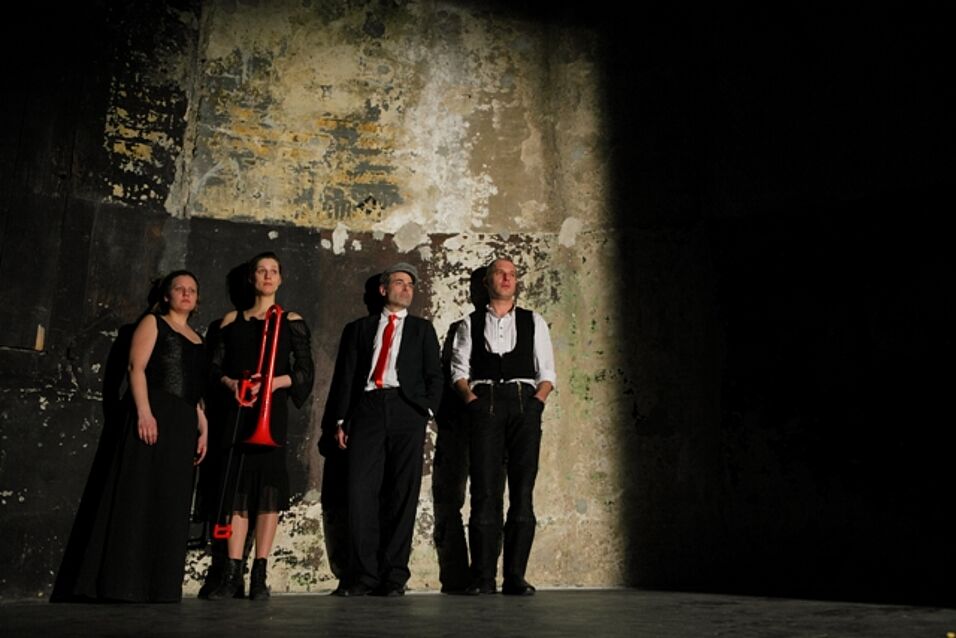
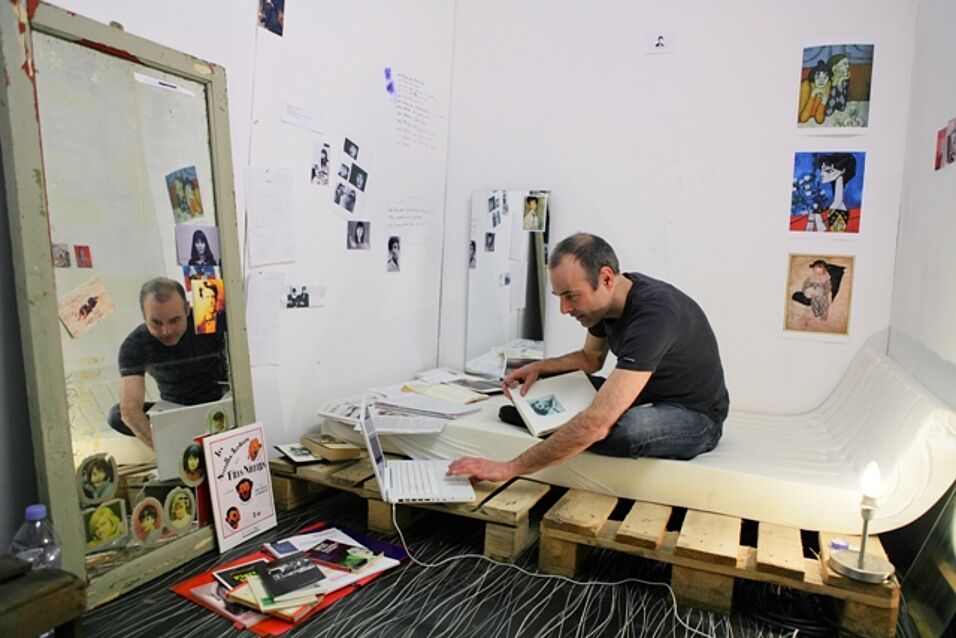
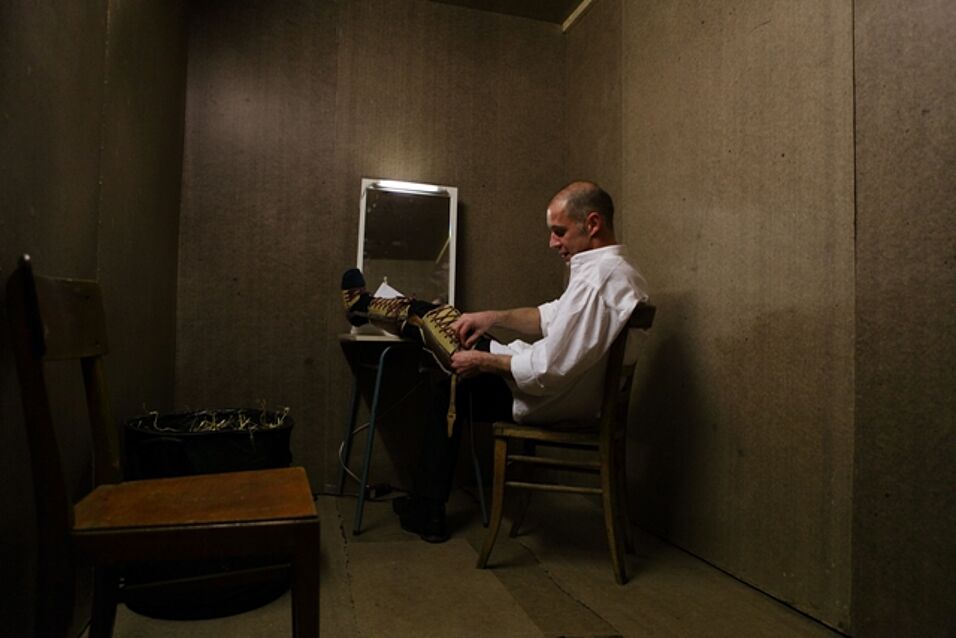
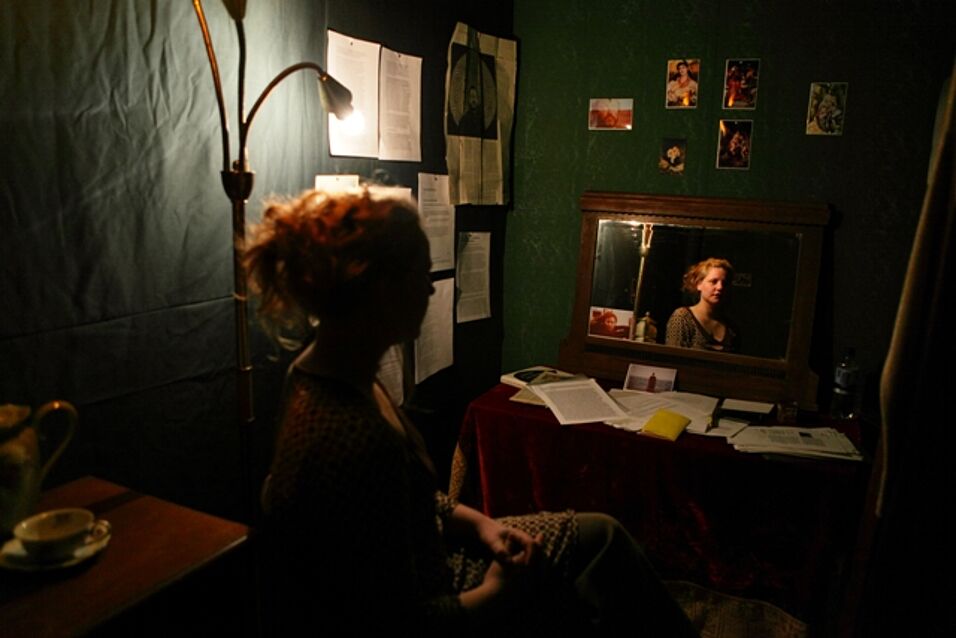

A new beginning. A day unlike any other. A green light flashes. You may enter. Back on a regular schedule: At the Schaubühne Lindenfels, starting 2012, a Leipzig-based theater ensemble will once again produce and perform theater. Celebrate this new beginning with us. We want to come to an understanding with you, about what theater means to us and to you. “A Twenty-Ninth of February” is a soft approach to what theater originally was, and what it can be today: a place with its own set of rules, a space-time machine, an aggregate of dialogue. From the theater box, in which only one spectator and actor will meet at a time, we enter together onto the big stage: silence, monologue, dialogue, and chorus, a theatrical tale that tells us about ourselves. “A Twenty-Ninth of February” traces the arc from the first, tentative beginnings of an encounter up to a grand scene. Get to know our actors, let them seduce you, believe their stories, or don't...
“When I'd known Andre, he'd been at the height of his career as a theater director. The amazing work he did with his company, The Manhattan Project, had just stunned audiences throughout the world ...But then, something had happened to Andre. He dropped out of the theater. He sort of disappeared. For months at a time his family seemed only to know that he was travelling in some odd place like Tibet. Which was really weird because he loved his wife and children, he never used to like to leave home at all. Or else you'd hear that someone had met him at a party, and he'd been telling people that he'd talked with trees or something like that. Obviously, something terrible had happened to Andre ... The whole idea of meeting him made me very nervous. I mean, I really wasn't up for that sort of thing. I had problems of my own. I mean, I couldn't help Andre. Was I supposed to be a doctor or what?” (Excerpt from “My Dinner With Andre” by Wallace Shawn and André Gregory)
Participating artists: René Reinhardt, Frank Heuel, Elisabeth Schiller-Witzmann, Frank Heuel, Laila Nielsen, Sophie Lutz, Johannes Gabriel, David Jeker, Elisabeth Schiller-Witzmann, Ilona Schaal


